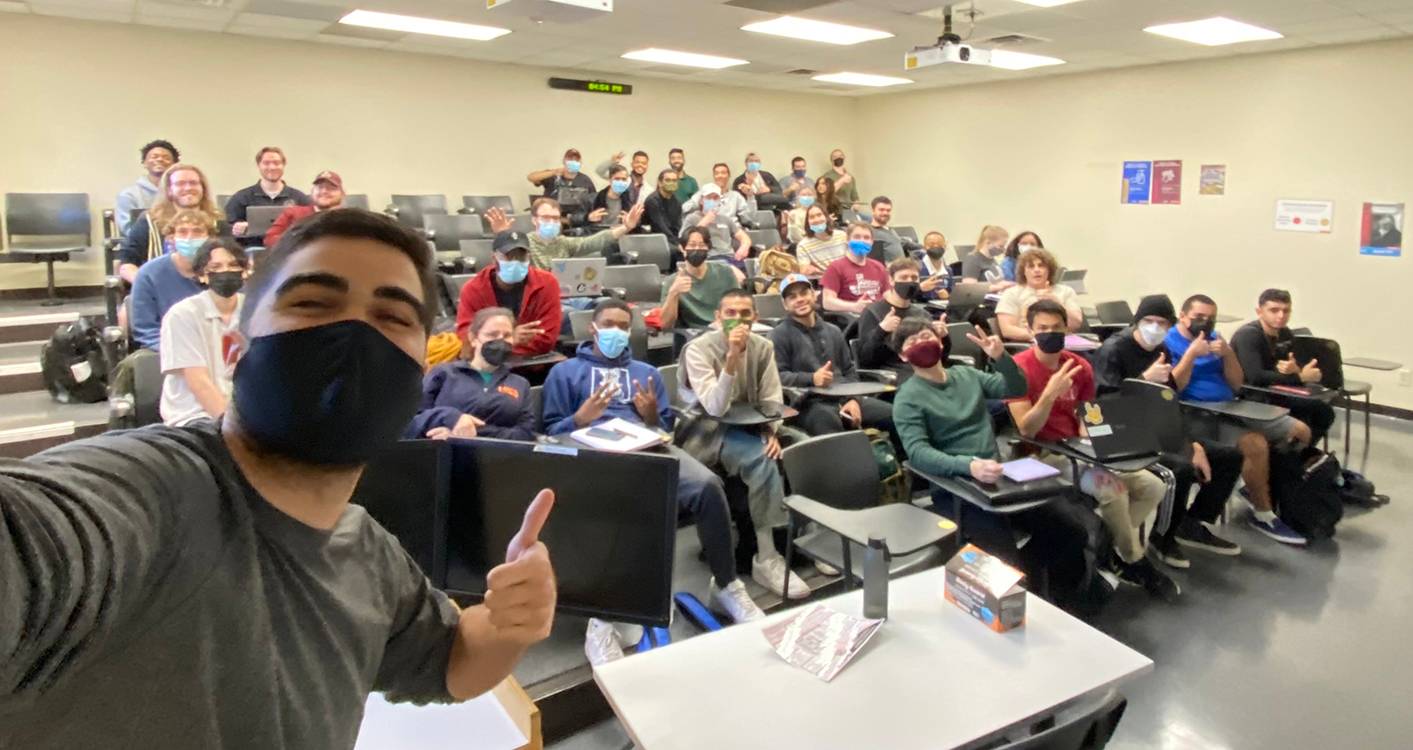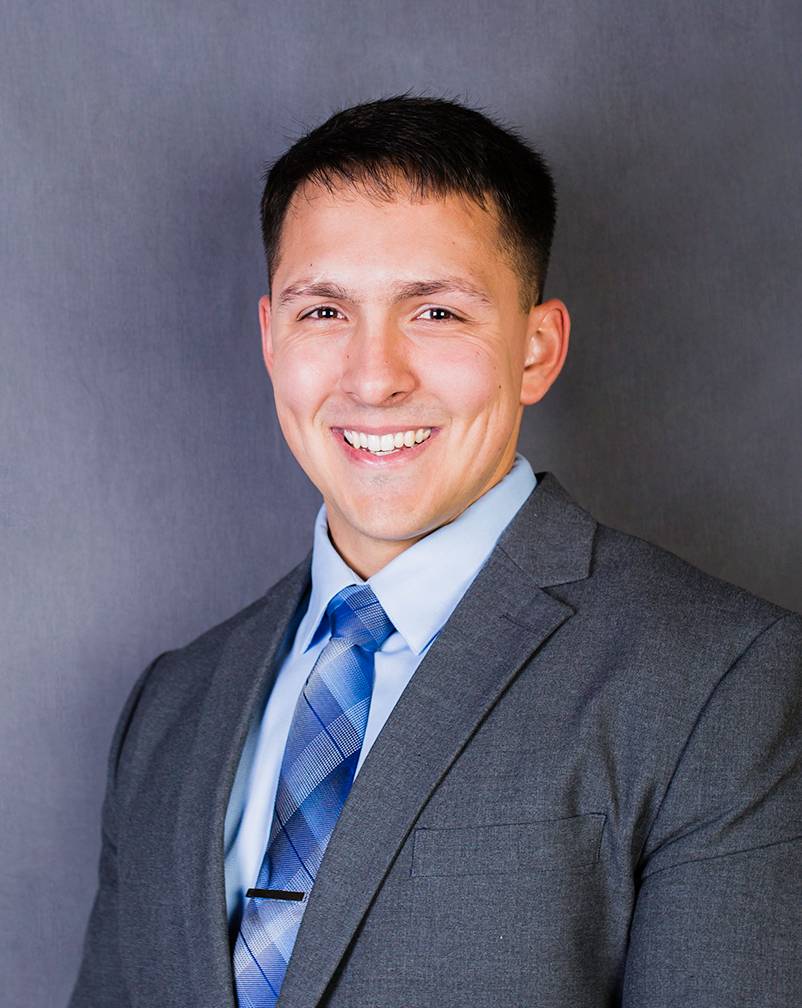Julie Cooper | February 16, 2022
When creator Mark Zuckerberg and friends started Facebook in 2004, it was intended to link his fellow Harvard University students with each other.
University students nationwide are still reaping benefits from Facebook, now under the corporate umbrella named Meta, but in a more academic way.
The Texas State University Department of Computer Science (CS) is in the second year of a three-year Engineer in Residence (EIR) program sponsored by Meta, which also includes Instagram, Facebook, and WhatsApp. Meta began the program in 2016 that pays salaries and expenses for its employees as temporary faculty at partner universities. These engineers design and teach an undergraduate computer science course, drive innovations to the computer science curriculum, and help develop extracurricular programming at various U.S. colleges and universities.
The program is designed to cultivate rigorous and inclusive computer science communities at minority-serving institutions. Texas State is the first university in the state to partner with Meta on the EIR program. The other universities currently in the program are Georgia State University and North Carolina A&T.

Sami Alsheikh, a software engineer at Meta, is the third EIR at Texas State and the first to teach two semesters. Alsheikh, 27, earned graduate and undergraduate degrees from the Massachusetts Institute of Technology (MIT). He volunteered for the EIR program because he loves to teach, and it was an opportunity to help show students they have what it takes to make it in the computing industry or to help close any gaps between academia and the industry. While attending MIT, he was a teaching assistant for computer graphics and taught computer science to refugees in Korea through MIT-Korea Global Teaching Lab.
After graduating MIT, Alsheikh was working for a startup when it was acquired by Meta. “It was an awesome experience. I really appreciate having worked at both a startup with 10 people and at one of the biggest companies. Those experiences have allowed me to guide students and highlight the different advantages one can get from all the different opportunities out there,” he said.
The son of Syrian-born physicians, Alsheikh praises Texas State students who work jobs while attending classes. “Many of them are taking a full course load while juggling so many other responsibilities. They often just need someone to help with the last 20% of the journey which is not normally as emphasized in university coursework,” he said.
The Meta professionals teach three classes: data structures, algorithms, and software engineering. This semester Alsheikh is teaching algorithms, where the goal for students is to improve problem-solving, coding, algorithms, and technical interviewing skills. Alsheikh estimates more than 50 students are in the class, which is an advanced-level elective. In addition to the classroom and workshops, Alsheikh also works with the EXE Computer Science Club, giving out some of the same interview lessons.
“I lecture twice a week, but a lot is happening outside of the classroom: extracurriculars, office hours, group homework sessions, and more. We also have something we call ‘Career Office Hours’ which is unstructured time dedicated to career prep questions. That might be where I give students mock interviews or review their resumes, for example,” Alsheikh said.

Charles “C.J.” Sherrow, 28, is a Texas State graduate who recently landed a job. He began his job search with 25 applications, had four interviews and got four job offers.
He starts work later this month for Meta in Seattle.
A Marine Corps veteran, Sherrow graduated in December with a CS degree, with a concentration in computer engineering. A native of Katy, Sherrow chose Texas State partly because his older brother was studying engineering here and offered his spare bedroom.
“Sami gave me guidance. He put me on the right path that I could not have taken, to apply to these big companies and put myself out there,” Sherrow said. “The program is awesome – but Sami as an individual is why I did so well. All students could benefit from this.”
Alsheikh said he aims to highlight what the students are learning relates to industry and how they can emphasize and add industry skills where necessary to bridge the gap between academia and the computer industry. The CS faculty and chairs have been very welcoming and innovative, Alsheikh said.
“It’s kind of an unspoken rule that to be successful in your CS career there is additional work required beyond the classroom. I like emphasizing that to students and highlighting that this isn’t just a Texas State thing. Students at all universities have to do the additional coding practice, be creative when applying to jobs, and prepare for these kinds of interviews.
“For CS-related jobs, there are behavioral questions, but the technical questions are what make these interviews a bit of a different game. The interviewer might say, ‘Suppose you had a large list of thousands of numbers, write code to sort this as efficiently as possible.’ That kind of interview is not something that comes naturally to anyone at first, and that's a big draw of the algorithms course. A lot of the course material is the foundational knowledge required to be successful in those kinds of coding interviews,” Alsheikh said.
Sherrow said he and Alsheikh would meet every Friday for 10 weeks for mock interviews. The questions got progressively harder. The job interview with Meta was virtual and included three rounds of programming questions and one behavioral round – each taking 45 minutes. He said the Microsoft job interview was just as intense.
Alsheikh said students are not pushed toward jobs at Meta, the company he represents. “if someone gets a job anywhere that's not Meta — that's somewhere they wouldn't have gotten to before, that is a success,” he said.
Sherrow said he used a pros/cons list to compare job offers. “Meta is known to be more innovative so that's kind of why I went there, and I had such a good experience with Sami,” he said. “I needed his guidance to put me on the right path. I would never have applied without him. For three months straight I did nothing but interview prep almost five to seven hours a day. It was a lot. I gave up my weekends and everything because I knew I had a goal in mind.”
“We are increasing our investments in CS job attainment readiness activities. Our baseline promise to TXST and any partner universities is that an engineer from our company will come in and teach a class and help connect industry with education. We are excited to increasingly add value in the realm of helping students not only attain a good CS education that’s relevant to industry but transform and translate that knowledge and that experience into work experience. Whether that’s an internship or a job. We do hope to continue making those investments over time." - Lina Pervez, Meta Education Program Manager | Emerging Talent Pipeline Programs & Partnerships
Share this article
For more information, contact University Communications:Jayme Blaschke, 512-245-2555 Sandy Pantlik, 512-245-2922 |
